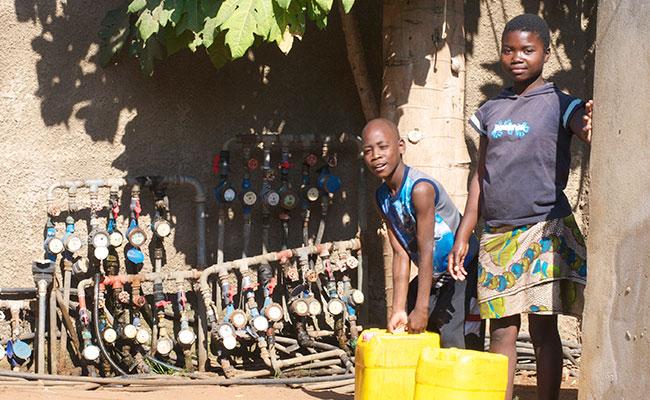Leveraging Partnerships for Water Security: Reducing Non-revenue Water in Uganda
Strengthening the private sector and public utilities to reduce non-revenue water and improve urban resilience

Innovations in Development: Solutions for a better future
Urban areas in many parts of Africa face the challenges of competition for water resources, inadequate infrastructure, droughts and water shortages, and non-revenue water loss—water that has been produced and is "lost" before it reaches the customer. In this post, Tetra Tech’s Leif Kindberg and Dr. Scott McCormick discuss how reducing the amount of water lost before it reaches the customer is integral to water security and the resiliency of urban water and sanitation services. All opinions expressed in this post are the authors’ own.
Cities are expecting a future with less water than needed. In South Africa, delayed water planning and management in Cape Town have led to significant impacts on economic growth and, recently, the implementation of residential and commercial water restrictions. “Day Zero is the day that almost all of the taps in the city will be turned off, and we will have to queue for water at approximately 200 sites across the peninsula,” according to the Cape Town government. Many cities today are asking when will our day zero arrive?
The World Bank estimates nearly 45 million square meters (m3) of water is lost daily from leakage worldwide—enough to serve nearly 200 million people—representing USD$4.6 billion in water revenue lost in developing countries annually. This is more than the World Bank, the largest institutional international water financier, lends every year for water projects. Non-revenue water losses reduce the amount of water available for consumption and deplete critical revenue that water utilities rely on to provide sustainable services.
In Uganda, the shared water system that services Jinja and Iganga towns until recently had one of East Africa’s highest rates of non-revenue water at 45 percent. The causes of water loss include leakages and broken metering, and poor management of water maintenance services, such as nonpayment of bills and illegal connections. Water lost to inefficient distribution meant less water available to support human health and well-being, businesses, and industry and less funding for Uganda’s National Water and Sewerage Corporation (NWSC) to provide additional services.
Though the U.S. Agency for International Development (USAID) Planning for Resilience in East Africa through Policy, Adaptation Research, and Economic Development (PREPARED) project, Tetra Tech established the Non-Revenue Water Reduction Partnership, which included the NWSC, international engineering and metering firm Itron Inc., the Uganda Coalition for Sustainable Development (UCSD), and Tetra Tech. The partnership aims to reduce non-revenue water by improving service delivery, developing a customer engagement framework, and providing innovative engineering and information and communications technology (ICT) solutions for reducing water losses and optimizing revenues. Below we detail some of the partnership’s efforts to improve the availability of and payment for water in Jinja and Iganga.
Improving service delivery. Tetra Tech worked with the NWSC to build a service delivery improvement program using the existing internal NWSC Performance Improvement Program and by developing and implementing a customer-oriented Quality Service Improvement Program. This five-step program gave utility staff the tools to set a new vision and values for improved service delivery, conduct a service audit, identify actions to improve services, get customer feedback, and prepare and implement service strategies for departmental and operational improvements.
Enhancing customer engagement. NWSC developed an interactive customer support and outreach framework based on a customer satisfaction survey and developed a Customer Engagement Framework (CEF). The CEF provided flexible opportunities for customers to be involved and influence the water and sewerage services they receive from NWSC and regularly evaluate customer satisfaction.
Improving water monitoring and management with engineering and ICT solutions. Itron Inc. and NWSC co-financed activities to improve the water distribution system through modern radio frequency units and a suite of smart water metering technologies and web-based monitoring applications. These tools helped NWSC measure water flows in real time and with increased accuracy and identify where water losses are concentrated, so that the utility can target solutions accordingly.
In just two years, NWSC reported non-revenue water in Jinja and Iganga has decreased from 45 percent to 20 percent, revenue has increased from USD$285,000 to USD$493,000 and water sales have grown from 276,071 m3 to 354,032 m3. An additional 12,102 people have been connected to public stand pipes using the increased revenues from the program. The Uganda NWSC Board of Directors has embraced the Quality Service Improvement Program and anticipates expanding the program to approximately 100 utilities in the country.
With approximately 50 percent of the global population experiencing at least four months of water scarcity per year, coupled with high uncertainty and variability in precipitation and droughts across whole regions like East Africa, robust water management solutions under multiple resource availability scenarios have never been more important. With an estimated 60 percent of the global population projected to live in urban areas by 2030, reducing non-revenue water is integral to water security and the resiliency of urban water and sanitation services.
Read a case study about non-revenue water in Jinja and Iganga Uganda or contact our international water team for more information.

